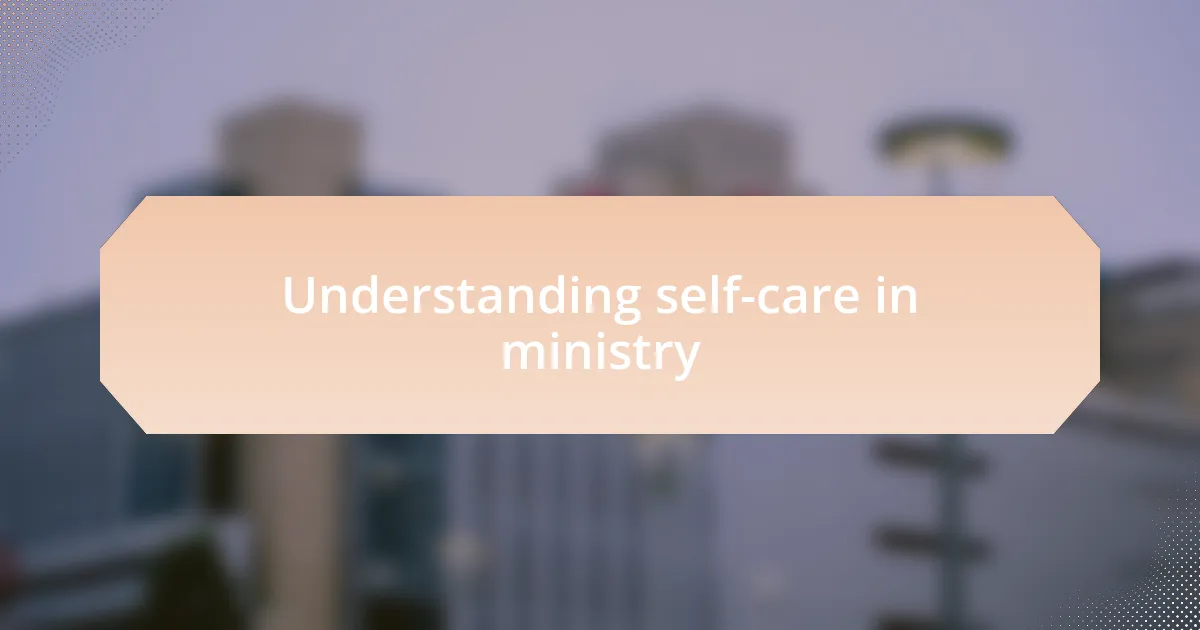Key takeaways:
- Self-care in ministry is essential for effective service and combats burnout by addressing emotional, spiritual, and mental health.
- Establishing a self-care routine with activities like reflection, physical movement, and gratitude can enhance resilience and restore energy.
- Utilizing support systems, such as peer groups and friendships outside of ministry, provides essential emotional support and perspective.
- Recognizing challenges in hospital ministry, such as emotional strain and unpredictability, emphasizes the need for healthy boundaries and flexibility.

Understanding self-care in ministry
Self-care in ministry is often seen as a luxury, but in reality, it is a necessity. I remember feeling completely drained after a particularly long week of hospital visits. It was only when I took a moment for myself, reflecting on how vital self-care was to my effectiveness in serving others, that I understood its importance. How are we expected to pour into others if our own wells are dry?
Recognizing the signs of burnout is crucial in this line of work. There was a time when I found myself overwhelmed, questioning my purpose and feeling emotionally detached from those I aimed to help. This experience taught me that self-care is not just about physical wellness; it’s a holistic approach involving emotional, spiritual, and mental health. Have you ever felt that gap between your commitment and your capacity?
Understanding self-care in ministry allows us to forge deeper connections with those we serve. I’ve learned that setting aside time for rest, reflection, and rejuvenation advocates for a sustainable ministry. It’s like fueling a car; without gas, even the best vehicle cannot function. What practices do you have in place to ensure you’re filled up enough to share your light with others?

Importance of self-care for ministers
The importance of self-care for ministers cannot be overstated. I recall a time when I pushed through a busy season without taking breaks, thinking I was being selfless. It only took one emotional breakdown in a hospital chapel for me to realize that neglecting my own needs diminished my ability to support others. How can we offer hope if we’re not in touch with our own hearts?
Self-care is foundational to maintaining spiritual health and resilience. After a long week of counseling, I learned that disconnecting from the pressures of ministry allowed me to return with renewed vigor. That quiet time wasn’t just a pause; it became a source of strength. Have you ever noticed how moments of solitude can sharpen your perspective?
In my experience, practicing self-care builds the emotional intelligence necessary for effective ministry. When I prioritize activities that restore my spirit, like journaling or a simple walk in nature, I find I become more empathetic and present. Isn’t it fascinating how taking care of ourselves makes us better equipped to care for others?

Common challenges in hospital ministry
Hospital ministry often presents unique challenges that can take a toll on one’s emotional and spiritual health. I’ve encountered moments when I felt overwhelmed by the sorrow in the hospital corridors, witnessing families facing unimaginable grief. It leads me to wonder: how can I carry the weight of others’ pain when I feel so burdened myself?
Another common challenge is the unpredictability of hospital environments. I remember a day when I prepared to visit a patient, only to be redirected multiple times due to emergencies. This experience taught me that flexibility is key, but it also left me feeling drained. How do we balance the need for adaptability with our own emotional stability?
Lastly, the emotional investment in patients can blur the boundaries between personal and professional life. I’ve found myself reflecting on patients long after my visits, questioning if I could have done more. It’s crucial to establish healthy boundaries, yet I often ask myself: how do we care deeply without losing ourselves in the process? This ongoing struggle is a testament to the complexity of ministering within such a sensitive space.

Effective self-care practices for ministers
Taking time for reflection is vital in ministry, especially within the hospital setting. I remember scheduling regular quiet moments for myself, allowing my mind to process the intense emotions I faced daily. These times of solitude helped ground me, prompting a question I often ask myself: what thoughts bring me peace amidst chaos?
Establishing a support system is another essential self-care practice. I’ve found that connecting with fellow ministers or mental health professionals creates a safe space to share experiences and challenges. This camaraderie reminds me that I’m not alone in my journey, sparking the thought: how can we uplift each other in our shared mission while maintaining our individual well-being?
Physical activity is also a game-changer for me. On days when the weight of caregiving feels heavy, taking a brisk walk around the hospital grounds refreshes my mind and spirit. I often think about how something as simple as moving my body can rejuvenate my energy—and I’ve learned that these moments not only enhance my focus but also bolster my capacity to serve others.

Creating a self-care routine
Creating a self-care routine requires intentionality. I’ve found that setting aside specific times during the week for activities that rejuvenate me is crucial. For instance, every Thursday morning, I dedicate an hour to reading a book I love. It’s like a mini-vacation for my mind, and I often ask myself how choosing this time for myself impacts my overall well-being.
Another key element in building my self-care routine is variety. I like to switch things up to keep my mind engaged. Some days, I practice mindfulness through meditation, while on others, I might call a friend for a deeper conversation. I can’t help but wonder—how does incorporating different activities keep my spirit vibrant and adaptable when I face emotionally taxing situations?
Lastly, I believe it’s vital to include moments of gratitude in my routine. Each night, I jot down three things I’m thankful for, which anchors me amidst the demands of ministry. Reflecting on these moments makes me think about how gratitude shapes my perspective and fuels my resilience in the challenging hospital environment.

Utilizing support systems in ministry
Utilizing support systems in ministry is a game changer. In my experience, having trusted colleagues or mentors to lean on can make all the difference. There have been times when I’ve faced challenging situations and simply needed someone to listen without judgment. Isn’t it comforting to know that you are not alone in your ministry journey?
I also find that participating in peer support groups can be incredibly beneficial. In one such group I joined, we share our struggles and successes openly. This creates a sense of camaraderie that helps me recharge emotionally. Doesn’t it feel good to be surrounded by individuals who truly understand the unique pressures of ministry?
Additionally, I make it a point to reach out to friends outside the ministry. Their perspectives help me maintain a balanced outlook. Recently, I had a long coffee chat with a friend who reminded me that it’s okay to take a step back and breathe. How often do we forget that self-care also involves connecting with those who can offer fresh perspectives?